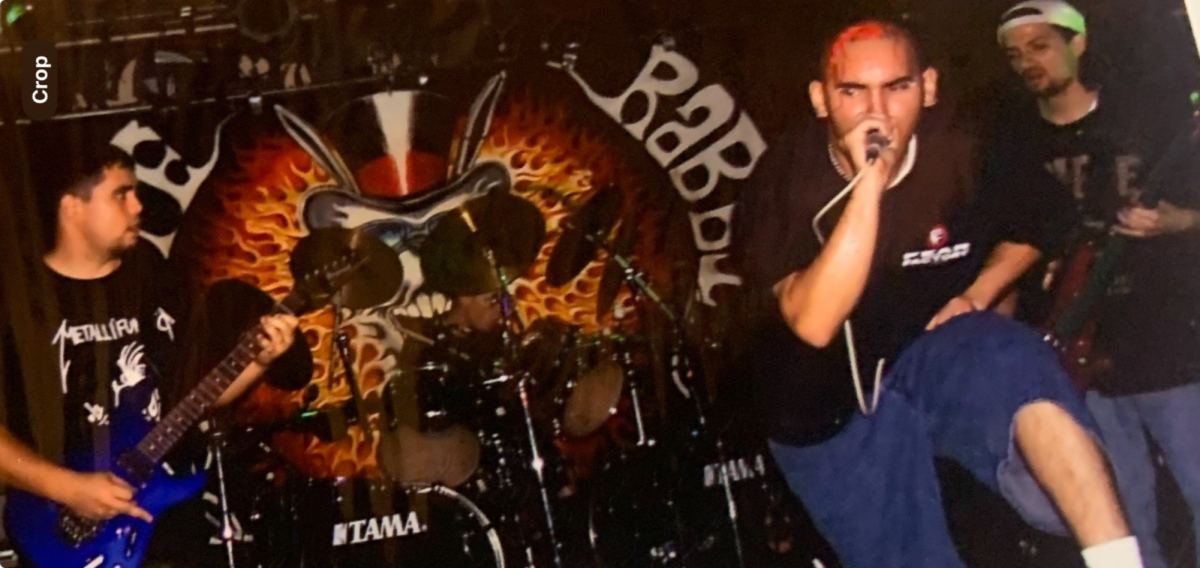Apart from extracurricular activities that are already included within the school, a lot of students have extracurricular activities that they do on their own or with organisations. For instance, musically oriented students might seek other people to play music together in a band.
“I mostly enjoy being able to bond with other people through music,” senior Kaysie Knorr. “When you play with other people, you’re able to communicate in ways other than speech that I feel create a stronger appreciation for the craft of music and the friends you play with.”
There are—and have always been—a lot of teenagers who would come together and play as a band. Proof is, Brian Stevens—currently a KAP Algebra II and AB Calculus teacher—played in a band when he was in middle school.
“I was friends with a guitar player [who] asked me if I wanted to play, because they needed a drummer, and I said ‘Sure,’” Stevens said. “He actually became the guitar player for a band called Darkest Hour, I dunno if you’ve heard of them, … but they’re touring.”
Dalton Kozak—currently a KAP Algebra II and Geometry teacher—had moved to the Katy area as he entered high school. Despite being two and a half hours away from home, music was an intangible home that helped him go through the motions of high school.
“I didn’t know anyone and I was really just trying to make friends,” Kozak said. “And of course, I thought it would just be cool to play at some dive bars or something in the area and go and tell my friends about it.”
Kozak started playing music when he was ten, with his dad being a bassist himself and his middle brother practising music as well.
“For a while, I did a test run to see what instrument I really wanted to stick with,” Kozak said. “When I was ten, I really experimented with guitar, bass, and drums, and by the time I was 12 it was when I was like ‘I wanna do bass.’”
Similarly, Rudy dela Rosa—currently an AP English Literature teacher—grew up surrounded by music because of his father who was a promoter for Van Halen. Dela Rosa is not the typical vocalist you would find; he leans more towards the metal, punk, and heavy side of rock.
“I started doing [vocal fries and deep growls] probably in middle school when I first heard Sepultura,” dela Rosa said. “I thought ‘He sounds like a demented cookie monster, and I wanna sound like a demented cookie monster.’ So that’s what I started doing—practising in the shower, of course, to get that.”
Since he first picked up a toy guitar at the age of 12, Scott Patterson—currently an AP Physics teacher—used his attuned musical hearing to practise playing songs just by listening to them.
“We had MTV back then, so I would sit on the couch…, have my guitar straight up and I’d just be playing,” Patterson said. “That’s when I got to where I [could] hear the music and just play it because it was too lazy to look. Eventually [you realise that] ‘If I move my hand from to here, it’s gonna sound like that.’”
Stevens also knew early on what instrument he wanted to play.
“I had always wanted to play drums,” Stevens said. “When I was three [years old], we went to a music festival and saw a band playing, and I just stood by the drummer, staring. I was like, ‘I’m gonna play that.’”
The biggest challenge when first creating a band is planning when to meet and what to play. Either their first rehearsals are butchered by heated arguments on what to play, or everyone vibes with everyone and manages to find a common ground.
“We played Sublime, a little Nirvana, Rage Against the Machine, [and] a lot of 90s grunge bands,” Stevens said. “I think it’s just all that we liked: we listened to the same stuff, and they were easy [to play].”
Unlike Stevens who was in a cover band in middle school, dela Rosa’s band dated from when he was in high school.
“We weren’t very athletic, so we wanted to try and do something to find our niche—our collaborative group,” dela Rosa said.
Just like Stevens and dela Rosa, Patterson also played in bands when he was in high school. He would play in front of small crowds of 13 people or their largest audience yet of 5,000 people. However, Patterson didn’t enjoy live performances as much.
“Strangely enough, people think ‘Oh yeah, you’re playing for a crowd, it would be so fun—everybody’s gonna listen to you and like you,’ but most of them are just [drunk] and acting dumb,” Patterson said. “Believe it or not, … the rehearsals, when we were in the house just playing stuff and making up songs—that was the most fun part for me.”
Before even playing on a stage, the band members would come and rehearse together some cover songs or original songs they create. A lot of times, this would entail at least one member to have a drum kit and more or less a sound system to get the band going.
“We rehearsed in my drummer’s living room,” dela Rosa said. “It’s always the drummer—you have to be where the drums are—and his parents were musicians as well so they were very very into it.”
Most of these teachers were—and still are—passionate about music and their respective instruments.
“I just played all the time,” Patterson said. “I mean, there were so many times where I’d fall asleep at night and I wake up in the middle of night and my guitar is like in the bed next to me.”
Even if band members’ paths diverge, they had the chance to play what they loved together and create long-lasting memories.
“You never forget your band or your band mates,” Stevens said.
All the whilst navigating through the ups and downs of high school (or college), music could serve as an escape for some students as they get to play with other people who are equally passionate about it.
“Play what you love and just have a blast doing it,” dela Rosa said. “Don’t worry about what anyone else says. Find your passion, follow it, go for it, and never let it die.”



